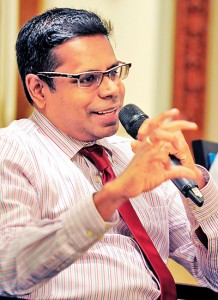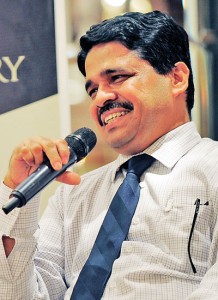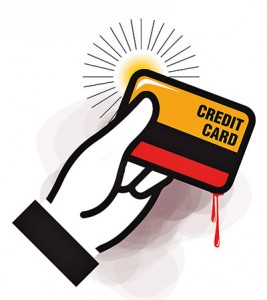Runaway spending: Buying a BMW on a Maruti income!
While Sri Lanka’s credit card penetration is sky rocketing at a rapid pace in the country, there are various fraudulent activities taking place due to lack of knowledge among cardholders and misconceptions of the card’s usage.

Dilshan Rodrigo
One such scenario is that some merchants in Sri Lanka charge extra for purchases using credit or debit cards more than the actual price of the merchandise. This is an illegal and fraudulent act against the regulations of the Central Bank (CB) and such cases should be complained to the Financial Ombudsman of Sri Lanka or referred to the Payments and Settlements Department of the banking regulator. Or the consumer could also complain to the bank which has a swiping machine in that particular merchant’s outlet.
Discounts for purchase of goods by cash is acceptable, but when using a credit or debit card there cannot be any additional charges involved in the transaction.
The 2 per cent cost involved during the transaction (paid by the merchant to the card issuing bank) must be borne by the merchant and cannot be passed on the consumer, which is becoming a common practice. There are merchants who charge even 5 per cent or more from the consumer.

R.A.A.Jayalath
These issues emerged during a panel discussion organised by the Sunday Times Business Club (STBC) themed “Credit Cards – Boon or Bane” at the Kingsbury Hotel in Colombo on Tuesday. An eminent panel of experts – Senior Sociology Prof. Siri Hettige, CB Assistant Governor R.A.A Jayalath and Hatton National Bank Chief Operating Officer Dilshan Rodrigo fielded questions and gave responses.
Mr. Rodrigo noted that 1.3 million credit cards are in use today in Sri Lanka, a figure that was small compared to the debit card penetration. “Credit card is an unsecured loan and if it’s managed well it’s one of the effective modes for transactions,” he added. Credit is given for periods from 30 to 55 days from the statement date and by the end of it, 5 per cent interest will be added. Debt is either collected by the bank or the outsourced service provider, stated Mr. Rodrigo elaborating on the debt collection process.
Mr. Jayalath, during the discussion mentioned that the Central Bank has clearly issued regulations on credit cards. He said, “Credit cards issuance regulations must be met in order to maintain the stability of the payment systems. Also when it comes to collection of debt from credit cards, regulations are implemented where prior warnings should be notified to the consumer while not seen as harassing the card holder.” There are 13 banks and two finance companies that issue credit cards in Sri Lanka and the public are advised to go to those registered banks or finance companies to obtain them, he added.
He noted that in 2015 there were only 406,000 credit cards in use while the number has drastically increased to 1.3 million as of today. Revenue from credit card transactions have increased from Rs. 50 million many years ago to Rs. 1.8 billion in 2015.
The Central Bank has concerns over personal loans from credit cards whereas the rate of loans are high, stated Mr. Jayalath while elaborating that if the credit limit exceeds a certain value, then the interest rate will go up which keeps fluctuating without stability. “Utilising 10 per cent of the credit is considered ideal while the maximum reach should be 30 per cent. Exceeding 30 per cent is not good at all,” noted Mr. Jayalath.

Prof.Siri Hettige
Prof. Hettige in his remarks pointed out the social issues and concerns that can occur due to over spending using credit cards. He said, “There is a very high level of spending in all developed countries around the world starting from the US. Looking at the developed world there is uncertainty of the future. With regards to employment in foreign countries most people have regular employment where they have a stable income. But in Sri Lanka the majority of people do not have a stable employment.”
He also mentioned that in Sri Lanka the household debt is equivalent to the country’s per capita income of US$3,800.
Prof. Hettige noted that a large number of institutions have moved into micro finance credit which was created for poor people in the country who couldn’t afford and as a source of financial services for entrepreneurs and small businesses lacking access to banking and related services. This in turn has created inflation. There are two sides for micro finance; the good and the bad, he added.
Being in debt is going to affect everybody, he stated while elaborating the informal sector doesn’t have much assets or pension schemes to fall back when they couldn’t pay back the debt.
On the question of whether Sri Lankans are living beyond their means, his response was: “We are living beyond our ecological assets. It is possible to live within our means. In foreign countries people spend more than what they earn because their social capital is built and the social security funds are huge. In Sri Lanka do we have such huge public assets? It is not a question of getting people into the credit card market. Since the poor does not have a casual income, they are neglected by the banks and a credit facility is not provided for them,” stressed Prof. Hettige.
During the question and answer session, Mr. Jayalath stated that credit cards are convenient, but people need to be mindful of the risks involved when exceeding the limit. “Unsecured credit is something you really need to be mindful and awareness has to be increased among the credit card users,” he added. He reiterated the plea of the CB that credit card users should be mindful of their spending limits and always try to pay the full amount before the due date rather than get into (eternal) debt.
It was also noted during the discussion that recently the CB has instructed banks that interest can be charged only on the remaining balance compared to earlier where the interest rate was charged on the total monthly bill even though the customer had already settled part or a large part of it.
Prof. Hettige stated that credit is something that is very important even in the traditional system such as ‘seettu’. People cannot continue to spend all the money they earn and go for alternatives, he noted.
| Judicious use of credit cards | |
| The three panellists at the discussion dealt with a range of issues including the regulatory role of the Central Bank, over-spending and getting into debt, managing debt, debit cards vs credit cards, interest rates and zero interest offers – how does it work, new areas of the credit card business and rising credit card debt among Sri Lankans.The following are some useful tips issued by the Central Bank:
Benefits of using credit cards
Before obtaining a credit card
Reporting to CRIB
Security measures
|


